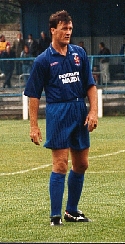|
|
|
|
|
BANGOR
LEAGUE GRADUATES |
| Credits
- thanks to those mentioned for their help and to Ian Garland for
countless pointers and information. Apologies to anyone who feels I have used materials without permission or acknowledgement, please contact via: mikesmithbcfc@yahoo.com |
|
| Bangor
City Managers Bangor City Managers Bangor City Managers
Bangor City Managers Bangor City Managers Bangor
City Managers Bangor City |
| 1918 to
1939 Between The Wars |
|
Sydney Beaumont
|
|
|
Len Davies
 |
|
|
Harry Hadley
 |
|
|
David Pratt
 |
|
| Bangor City Managers Bangor City Managers
Bangor City Managers Bangor City Managers Bangor
City Managers Bangor City Managers Bangor City |
| 1946 - 72 Post War
To Early Seventies |
| George Richardson |
|
|||
Roland Depear |
|
|
Tommy Jones
 |
|
Mick McGrath  |
|
|||
Ken Barnes  pictured (right) with Leeds legend Don Revie |
|
|||
John Doherty |
|
| Bangor City Managers Bangor City Managers
Bangor City Managers Bangor City Managers Bangor
City Managers Bangor City Managers Bangor City |
| 1972-78 Years of
Pain & Glory |
Alex Smith |
|
||
| Dick Jones |
|
||
|
Barry Ashworth  |
|
Roy Rees
|
|
|
Dave Elliot
 |
|
|
Stuart Mason  |
|
| Bangor City Managers Bangor City Managers
Bangor City Managers Bangor City Managers Bangor
City Managers Bangor City Managers Bangor City |
| 1979 - 84 Ups
& Downs |
|
Stan Storton
 |
|
|
Colin Hawkins
 |
|
|
Dave Elliot
 |
The 1981-82 season was the only time Bangor won the Northern Premier League, the only Welsh Club to do so, and the most successful period under manager Dave Elliott. Under the guidance of Wrexham based Chairman Charles Roberts a team of genuine ability and prolific goalscoring was constructed. Top scorer Graham Bennett was unstoppable, alongside him Graham Whittle, Dave Smallman, Gwyn Peris Jones, Phil Lunn and Meillir Owen. Promotion ensued to the Alliance with new chairman John Ross Jones taking charge upstairs in April 1983. Elliott led City to the 1984 FA Trophy appearance at Wembley, Paul Whelan and Mark Gray, and then - relegation. |
| Bangor
City Managers Bangor City Managers Bangor City Managers
Bangor City Managers Bangor City Managers Bangor
City Managers Bangor City |
| 1984 - 92 The
Northern Premier League |
|
John Mahoney
 |
|
| John Aspinall |
|
| Kevin Mooney |
|
|
| Brian Owen |
|
|
|
John Mahoney
 |
John Mahoney came back due to popular demand in the late eighties, but the magic was gone. To be fair he made some dreadful blunders, such as releasing Derek Goulding and cold shouldering Iain Sankey, in favour of the likes of Colin Tatlock. The club was spiralling into near terminal decline and the Board had no answers. The supporters were divided by the looming spectre of the proposed League of Wales and what happened on the pitch was less than relevant. At the end of the season all the NPL players left and the new horizon dawned. |
| Bangor City Managers Bangor City Managers
Bangor City Managers Bangor City Managers Bangor
City Managers Bangor City Managers Bangor City |
| 1992-2007 The Welsh Premier |
|
Ernie Whalley
 |
|
Paul Rowlands 
|
|
|
|
Nigel Adkins
 |
|
|
Bryan Griffiths  |
|
|
Kevin Langley
 |
|
Graeme Sharp
 |
|
|
Johnny King
 |
|
Lee Williams  |
|
|
Meirion
Appleton  |
|
|
Peter Davenport
|
|
|
Clayton Blackmore
 |
|
|
Steve Bleasdale
 |
|
|
Nev Powell
 |
|